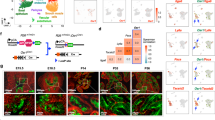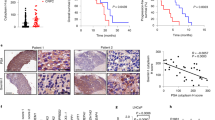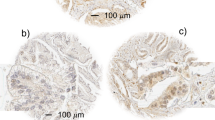Abstract
Identification of prostate cancers at high risk of progression is difficult and a better understanding of how peptide growth factors influence cellular function might be useful. Fibroblast growth factors (FGFs) have been implicated in prostate cancer development. FGF8 was identified in the Shionogi mouse mammary carcinoma SC-3 cell line as an androgen-induced mitogen. We tested if FGF8 was over-expressed in human prostate cancer and if its expression correlated with clinical data and outcome. One hundred and six cases of prostate cancer and ten cases of BPH were examined. In situ hybridization was employed to detect FGF8 mRNA expression, which was identified within the malignant prostatic epithelium in 85/106 (80.2%) cases. Increased expression of FGF8 correlated significantly with higher Gleason scores (P=0.0004) and advanced tumour stage (P=0.0016). Using immunohistochemistry, we confirmed over-expression of the FGF8b isoform. Men with tumours which expressed high levels of FGF8 had worse survival (P=0.034), although FGF8 mRNA was not able to provide additional prognostic information in a multivariate analysis. Additionally, FGF8 expression was shown to persist in androgen independent prostate cancer. Using a range of normal adult tissues, FGF8 expression was restricted to neurones and the germinal epithelium in addition to the prostate. In vitro studies demonstrated that in the presence of neutralizing antibody to FGF8b there was significant inhibition of prostate cancer cell growth, confirming the biological significance of FGF8 in prostate carcinogenesis.
This is a preview of subscription content, access via your institution
Access options
Subscribe to this journal
Receive 50 print issues and online access
$259.00 per year
only $5.18 per issue
Buy this article
- Purchase on Springer Link
- Instant access to full article PDF
Prices may be subject to local taxes which are calculated during checkout




Similar content being viewed by others
References
Crossley PH, Minowada G, MacArthur CA and Martin GR. . 1996 Cell 84: 127–136.
Gemel J, Gorry M, Erhlich GD and MacArthur CA. . 1996 Genomics 35: 253–257.
Ghosh AK, Shankar DB, Shackleford GM, Wu K, T'Ang A, Miller GJ, Zheng J and Roy-Burman P. . 1996 Cell, Growth & Differ. 7: 1425–1435.
Ittman M and Mansukhani A. . 1997 J. Urol. 157: 351–356.
Lee SM, Danielian PS, Fritzsch B and McMahon AP. . 1997 Development 124: 959–969.
Leung HY, Dickson C, Robson CN and Neal DE. . 1996 Oncogene 12: 1833–1835.
Leung HY, Mehta P, Gray L, Collins AT, Robson CN and Neal DE. . 1997 Oncogene 15: 1115–1120.
MacArthur CA, Lawshe A, Xu J, Santos-Ocamp S, Heikinheimo M, Chellaiah AT and Ornitz DM. . 1995a Development 121: 3603–3613.
MacArthur CA, Lawshe A, Shankar DB, Heikinheimo M and Shackleford GM. . 1995b Cell Growth & Differ. 6: 817–825.
Mason I. . 1994 Cell 78: 547–552.
Myers RL, Chedid M, Tronick SR and Chiu I-M. . 1995 Oncogene 11: 785–789.
Office For National Statistics. . 1996 Population and Health Monitor DH2 96/2.
Payson RA, Wu J, Liu Y and Chiu I-M. . 1996 Oncogene 13: 47–53.
Rudra-Ganguly N, Zheng J, Hoang AT and Roy-Burman P. . 1998 Oncogene 16: 1487–1492.
Schmitt JF, Hearn MT and Risbridger GP. . 1996 J. Steroid Biochem. Mol. Biol. 57: 173–178.
Smallwood PM, Munoz-Sanguan I, Tong P, Macke JP, Hendry SHC, Gilbert DJ, Copeland NG, Jenkins NA and Nathans J. . 1996 Proc. Natl. Acad. Sci. USA 93: 9850–9857.
Susuki H, Freije D, Nusskern DR, Okami K, Cairns P, Sidransky D, Isaacs WB and Bova GS. . 1998 Cancer Res. 58: 204–209.
Tanaka A, Miyamoto K, Minamino N, Takeda M, Sato B, Matsuo H and Matsumoto K. . 1992 Proc. Natl. Acad. Sci. USA 89: 8928–8932.
Tanaka A, Miyamoto K, Matsuo H, Matsumoto K, Yoshida H. . 1995 FEBS Lett. 363: 226–230.
Tanaka A, Furuya A, Yamasaki M, Hanai N, Kuriki K, Kamiakito T, Kobayashi Y, Yoshida H, Koike M and Fukayama M. . 1998 Cancer Res. 58: 2053–2056.
Yazidi IE and Boilly-Marer Y. . 1995 Anticancer Res. 15: 783–790.
Acknowledgements
This study was funded partly by The Cancer Research Campaign; Trevor J Dorkin is supported by The Royal College of Surgeons of England and the NHS R&D programme.
Author information
Authors and Affiliations
Rights and permissions
About this article
Cite this article
Dorkin, T., Robinson, M., Marsh, C. et al. FGF8 over-expression in prostate cancer is associated with decreased patient survival and persists in androgen independent disease. Oncogene 18, 2755–2761 (1999). https://doi.org/10.1038/sj.onc.1202624
Received:
Revised:
Accepted:
Published:
Issue Date:
DOI: https://doi.org/10.1038/sj.onc.1202624
Keywords
This article is cited by
-
Blood-based gene expression signature associated with metastatic castrate-resistant prostate cancer patient response to abiraterone plus prednisone or enzalutamide
Prostate Cancer and Prostatic Diseases (2021)
-
Fibroblast growth factor 8 overexpression is predictive of poor prognosis in pancreatic ductal adenocarcinoma
European Surgery (2020)
-
Pathway-based expression profiling of benign prostatic hyperplasia and prostate cancer delineates an immunophilin molecule associated with cancer progression
Scientific Reports (2017)
-
Prostatic microenvironment in senescence: fibroblastic growth factors × hormonal imbalance
Histochemistry and Cell Biology (2014)
-
FGF Receptor Inhibitors: Role in Cancer Therapy
Current Oncology Reports (2012)



